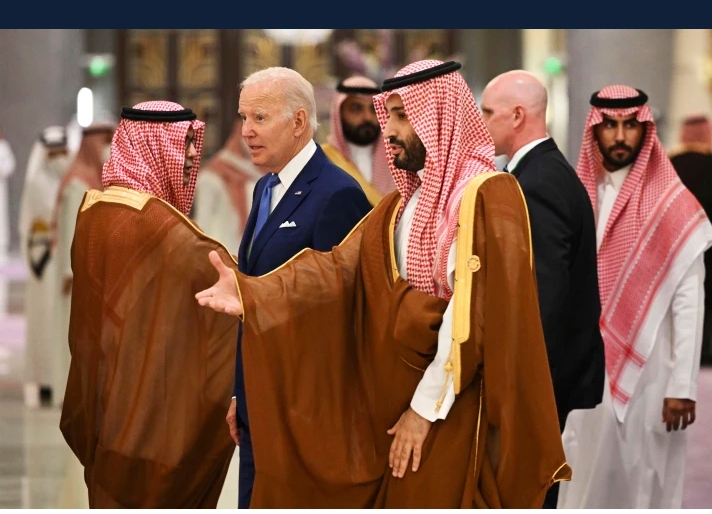Saudi Arabia has recognised that peace and stability in the region aren’t possible without Palestinian interests being addressed.
As Hamas launched its murderous attacks on Israel on October 7, the assault has forcefully capsized Israeli sweats, supported by the United States, to promote a normalization of relations with Arab countries without conceding anything to the Palestinians. Specifically, the Gaza war has dealt a mortal blow to the sweats for Saudi Arabia to normalise ties with Israel.
On September 22, Israel’s Prime Minister Benjamin Netanyahu was at his arrogant and triumphalist stylish as he gestured two charts to embellish his speech at the United Nations General Assembly one depicted an isolated Israel in 1948, while the other showed Arab neighbours that now had peace agreements with Israel — Egypt, Sudan, the United Arab Emirates, Saudi Arabia, Bahrain, and Jordan.
It also showed all the engaged Palestinian homes — the West Bank, Gaza and East Jerusalem — as integral corridor of Israel.Mr. Netanyahu specifically saluted the normalisation process with Saudi Arabia underU.S. aegis , and claimed that the Palestinians should have no proscription over the process. – backed tactfulness Netanyahu’s reflections reflected the flurry of politic exertion over the last many months between Washington, Tel Aviv and Riyadh asU.S. officers pushed for politic relations between Israel and Saudi Arabia, conceivably within this time.
American and Israeli officers intimately affirmed that the broad silhouettes of the agreement have been finalised. Meanwhile, two Israeli Ministers visited Saudi Arabia for transnational conferences, signifying adding bonhomie between the two countries. The normalisation deal had depended on three conditions that the area had placed before theU.S.U.S. blessing for a mercenary nuclear programme that provides for uranium enrichment within the country; an “ iron- sheathe ”U.S. security guarantee for the country, and deals of advanced munitions.
The Americans were said to be averring that Saudi Arabia backU.S. interests on oil painting prices, adulterate its political, military and technological ties with China and consolidate strategic engagement with theU.S. Saudi Arabia’s three conditions for normalisation were contentious in Israel and theU.S. SeveralU.S. politicians opposed the idea of giving security guarantees to an authoritarian state. They also advised theU.S. President against Saudi Arabia developing its own nuclear programme, believing that it poses an inferior proliferation threat — a concern participated in Israel as well. There were also obstacles to theU.S. deals of advanced munitions, largely due to Saudi Arabia’s poor mortal rights record at home and in Yemen.
- Eventually, there were enterprises about Saudi asseveration that arms inventories be accompanied by a transfer of technology to develop its arms assiduity. Despite these obstacles, theU.S. was confident the deal would go through. Palestinian interests and enterprises didn’t figure in these normalisation conversations. Given the revolutionist political coalition thatMr. Netanyahu heads, there was no interest in Israel to give indeed lip service to Palestinian bournes for a autonomous and feasible state or accept East Jerusalem as the capital of that state.
In fact,Mr. Netanyahu wasn’t indeed willing to promise indurating agreements in the West Bank, postponing annexation, or dismembering illegal posts. At that time, hundreds of Israel’s religious crusaders, backed byMr. Netanyahu’s Ministers, made instigative irruptions into the Al- Aqsa complex, while the settlers in the West Bank increased violence against their Palestinian neighbours, generally with the support of the security forces. Saudi- Iran ties The Gaza war has formerly again placed the Palestinian issue at the centre of West Asian politics.
Some pens are condemning Iran, arguing that the Islamic Republic has instigated the Hamas attacks to block Saudi Arabia’s normalisation action with Israel. This argument has little credibility. Saudi- Iran ties have formerly been normalised under Chinese agreement delegacies have beenre-opened in both centrals, high- position visits have been changed and profitable cooperation is being expanded. Now, following the Hamas attacks, the area has recognised that peace and stability in the region aren’t possible without Palestinian interests being addressed.
In an sanctioned statement, the Saudi Foreign Office has recalled the area’s “ repeated warnings of the troubles of the explosion of the situation as a result of the occupation, the privation of the Palestinian people of their licit rights and the reiteration of methodical provocations of its holiness ”. This statement is pertaining to the abuses countenanced by the Netanyahu government — profanation of the Al- Aqsa Mosque complex and agreement expansion and settler violence in the West Bank. Saudi Crown Prince Mohammed bin Salman has now asserted that the area will “ stand by the Palestinian people to achieve their licit rights to a decent life, achieve their expedients and bournes , and achieve just and lasting peace ”.
Palestinian interests in focus Again, the Saudis have abandoned expedient to insincere verbal assurances to the Palestinians that were under consideration during the normalisation accommodations. The hunt now is for concrete action to serve Palestinian interests, As the Saudi intelligencer, Faisal Abbas, has written “ the transnational community must act now to spark a believable peace plan that enables a two- state result ”. Looking ahead, it has been egregious over the last three times that the area had signed off the American servitude and was pursuing its foreign policy engagements in terms of its own interests, without anyU.S. involvement. The area rejects theU.S. interest in erecting ananti-China coalition encyclopedically and ananti-Iran Mafia regionally.
Again, anyhow of theU.S.’s wishes there’s no question of Saudi Arabia accommodating the Americans on oil painting prices or lacing its comprehensive strategic ties with China. They illustrate its assertion of strategic autonomy and are an integral part of its hunt for different, multifaceted, and substantial ties across Asia. Promoting the Palestinian cause will now form an important part of this foreign policy approach.
For more information visit at https://happenrecently.com/zepto/?amp=1
Source: www.indianexpress.com







